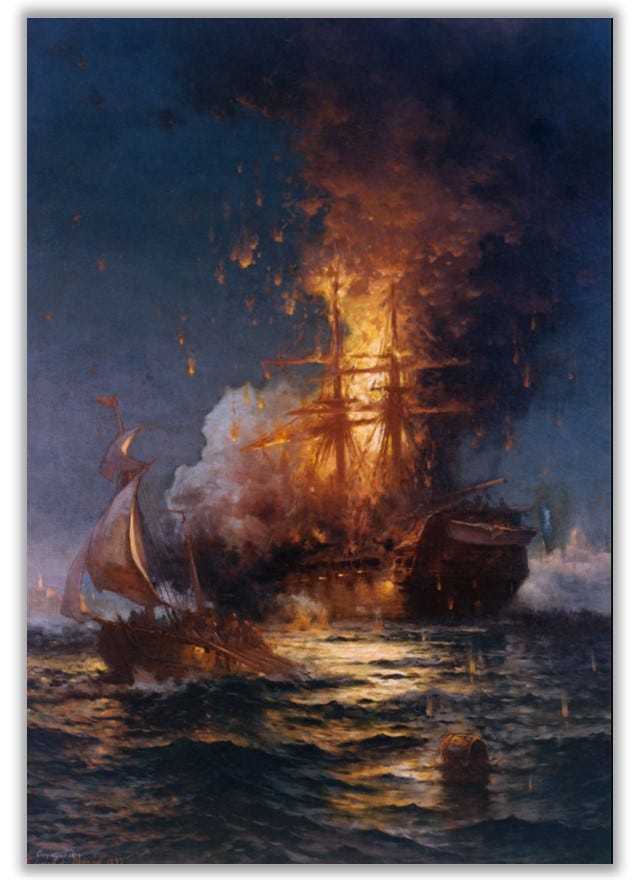TDIH: USS Philadelphia, set ablaze
Stephen Decatur’s feat has been called the “most bold and daring act of the age.” But why would a United States naval officer set an American ship on fire?
On this day in 1803, the Tripolitans capture a stranded American vessel. Mere months later, Navy legend Stephen Decatur would set that same U.S. frigate ablaze. His action has been called the “most bold and daring act of the age.”
But why would a United States naval officer set an American ship ablaze?
The audacious stunt occurred during the First Barbary War, soon after USS Philadelphia ran into an uncharted reef on October 31, 1803. She was soon captured by the Tripolitans and was considered a valuable prize. Once repaired, she would be the Barbary states’ most powerful warship. Meanwhile, the U.S. Navy had only one remaining ship as powerful as the one they’d lost: USS Constitution.
The commander of the Mediterranean Squadron, Edward Preble, fully understood the emergency, writing that “this affair distresses me beyond description . . . .” He chose then-Lt. Stephen Decatur to lead a raid. If he couldn’t recover Philadelphia, then Decatur must ensure destruction of the 36-gun frigate.
Decatur departed for his mission in a ketch (a two-masted sailboat), the Intrepid. That vessel was disguised as a Maltese trading ship, and she would carry a crew of several dozen volunteers. Decatur intended to enter Tripoli harbor with most of his crew hidden below decks. Meanwhile, an Arabic-speaking Sicilian, Salvador Catalano, would be on deck, ready to translate.
Decatur and his men entered Tripoli harbor late on February 16. They sailed past the shore batteries, carefully approaching Philadelphia at roughly 9:30 p.m. The Tripolitans aboard the ship called out to Intrepid, demanding that she identify herself.
Catalano answered in Arabic, claiming that Intrepid was a Maltese ship that had lost anchors. She needed to tie up alongside Philadelphia for the night. The weather had been tough, and the lie was believable. The Tripolitans were deceived—at first. They allowed Intrepid closer, readying a line to hold the two.
Just then someone aboard Philadelphia noticed something amiss. He yelled out in Arabic, “They are Americans! They are Americans!”
The commander of the guard hesitated, asking Catalano who was aboard Intrepid. Things were happening quickly. The guard yelled another warning, causing the commander of the guard to cast off a line. Catalano panicked and yelled, “Board, Captain, board!”
But Catalano had misjudged the situation. The two boats were not yet close enough. Fortunately, Decatur was calm. “No order is to be obeyed but that of the commanding officer,” he barked. Just then, the vessels came together. It was time. Decatur shouted one word: “Board!”
His crew came topside and charged aboard Philadelphia. They were armed with swords, axes, and knives. The Tripolitans were easily overwhelmed, and Decatur’s men began setting combustibles around the ship. Finally, Decatur gave the final order. Fires were set. The Americans leapt back aboard Intrepid.
Preble later summarized Decatur’s successful destruction of Philadelphia, writing that they had, “after a conflict of a few minutes; carried her by the sword, without firing a musket or pistol: then set her on fire in every part, & she was totally consumed with all her materials: we did not lose a man, & only one was wounded: between 20 & 30 Tripolines were killed; one large boat load made their escape; many leapt into the sea & it is supposed a number hid themselves below, & perished in the flames . . . .”
By dawn on the 17th, Intrepid was 40 miles away, but the burning Philadelphia could still be seen in the distance.
In recognition of his feat, Decatur was promoted to Captain at age 25. He remains the youngest to attain that rank in US naval history.
Sources can always be found on my website, here.





The simple answer is that it was better to it destroyed than to have it repaired and have it used against the USA by our enemies.
This was pretty much the common practice of military for years until our unceremonious exit from Afghanistan, by our idiot of a President.
❤️🇺🇸🇺🇸🇺🇸
Another piece of history I didn’t know. It almost went wrong, but due to Lt. Stephen Decatur keeping calm under the pressure the Americans accomplished their mission. I love the way you present our historical events, Tara. They are always filled with interesting details.